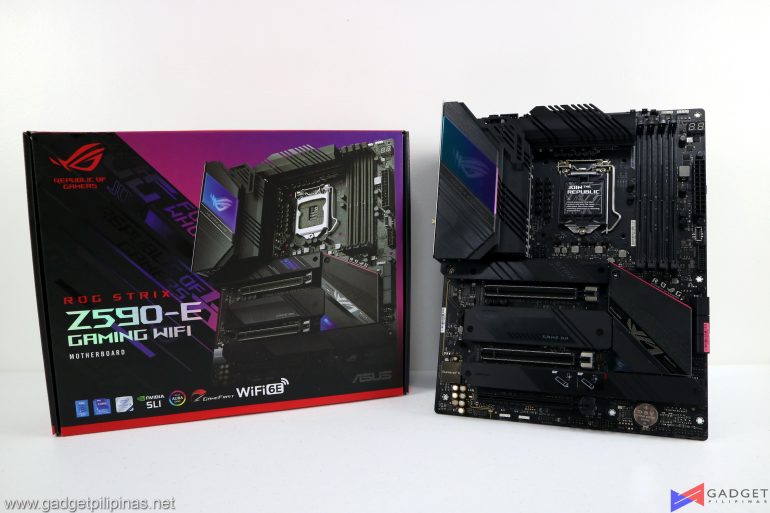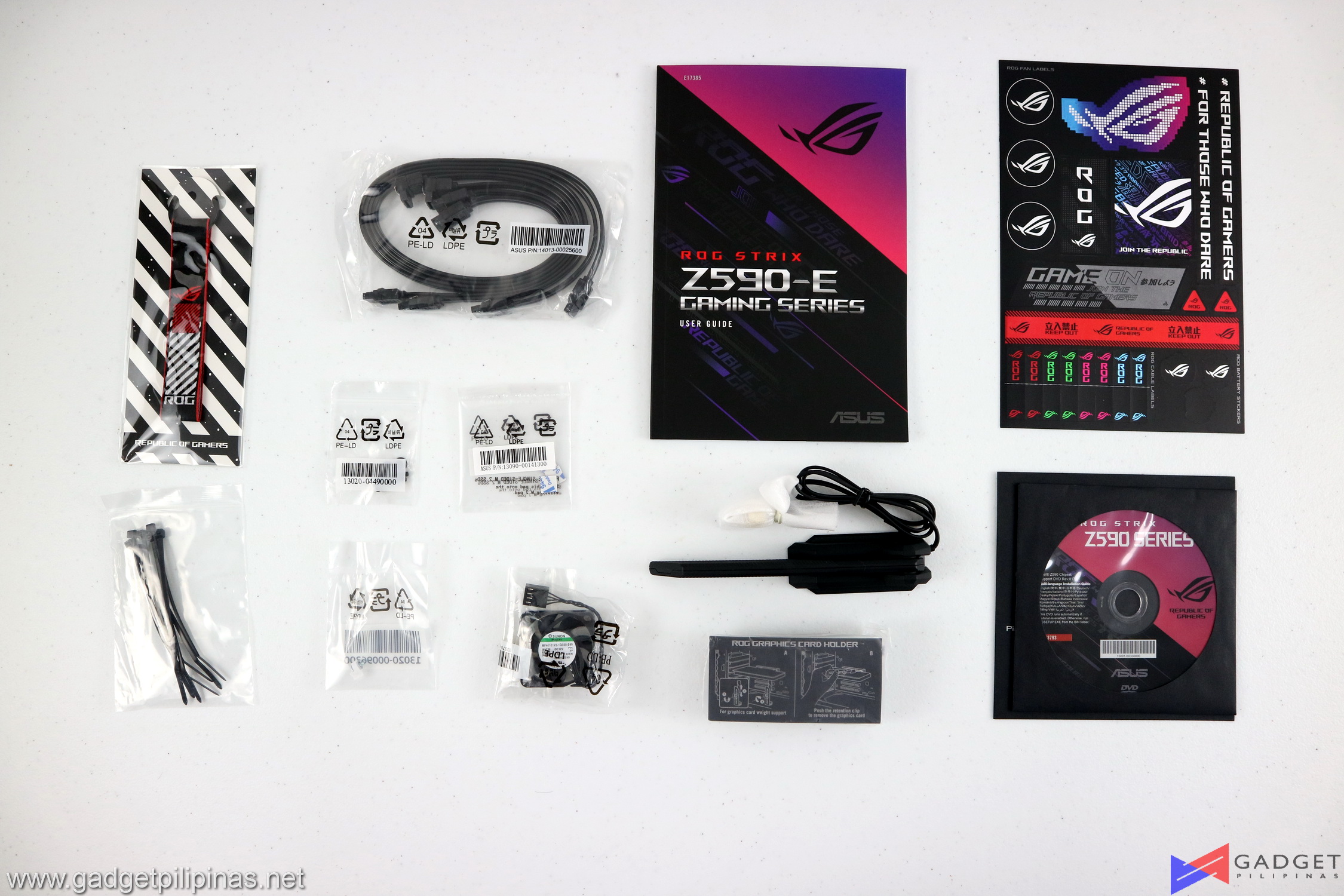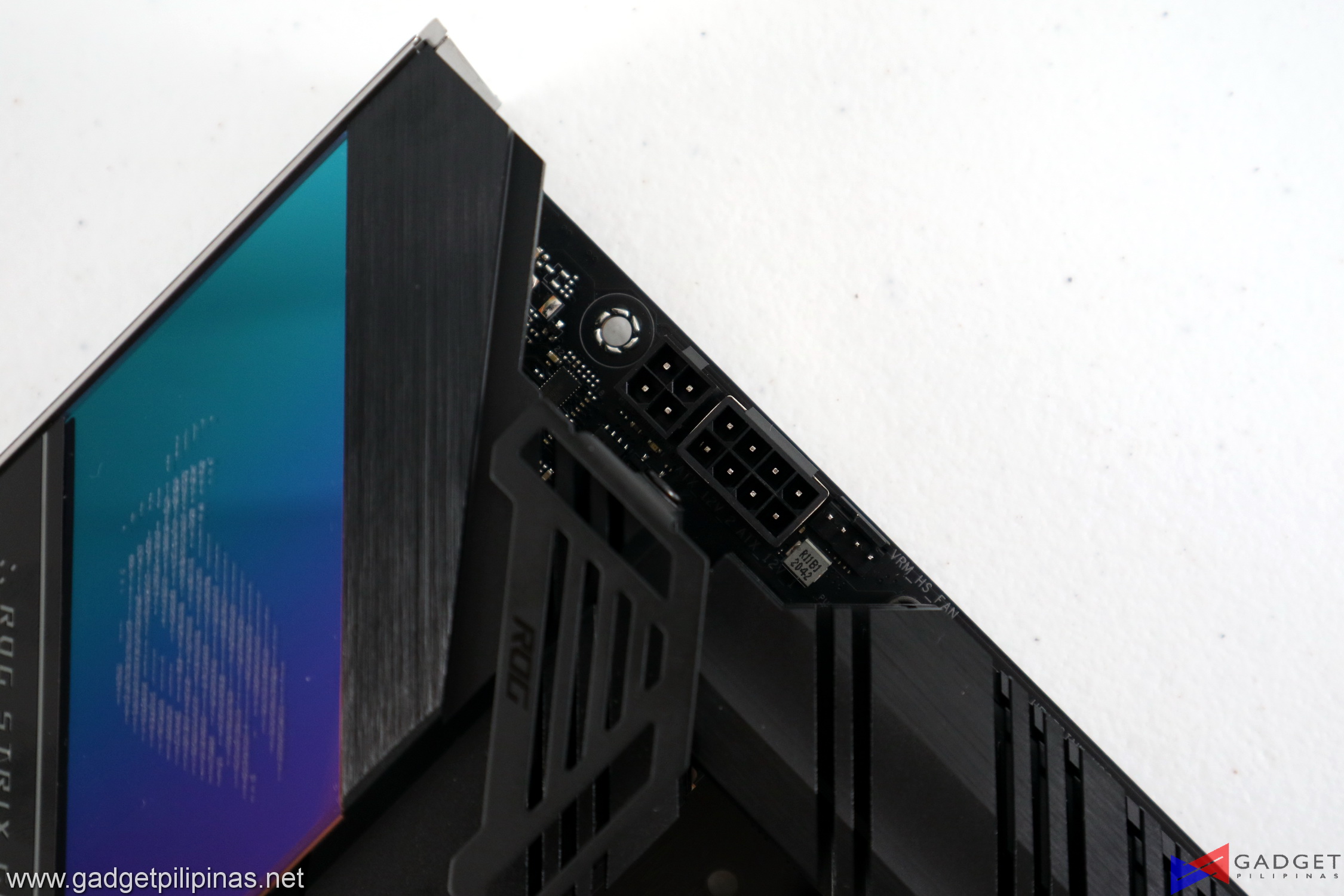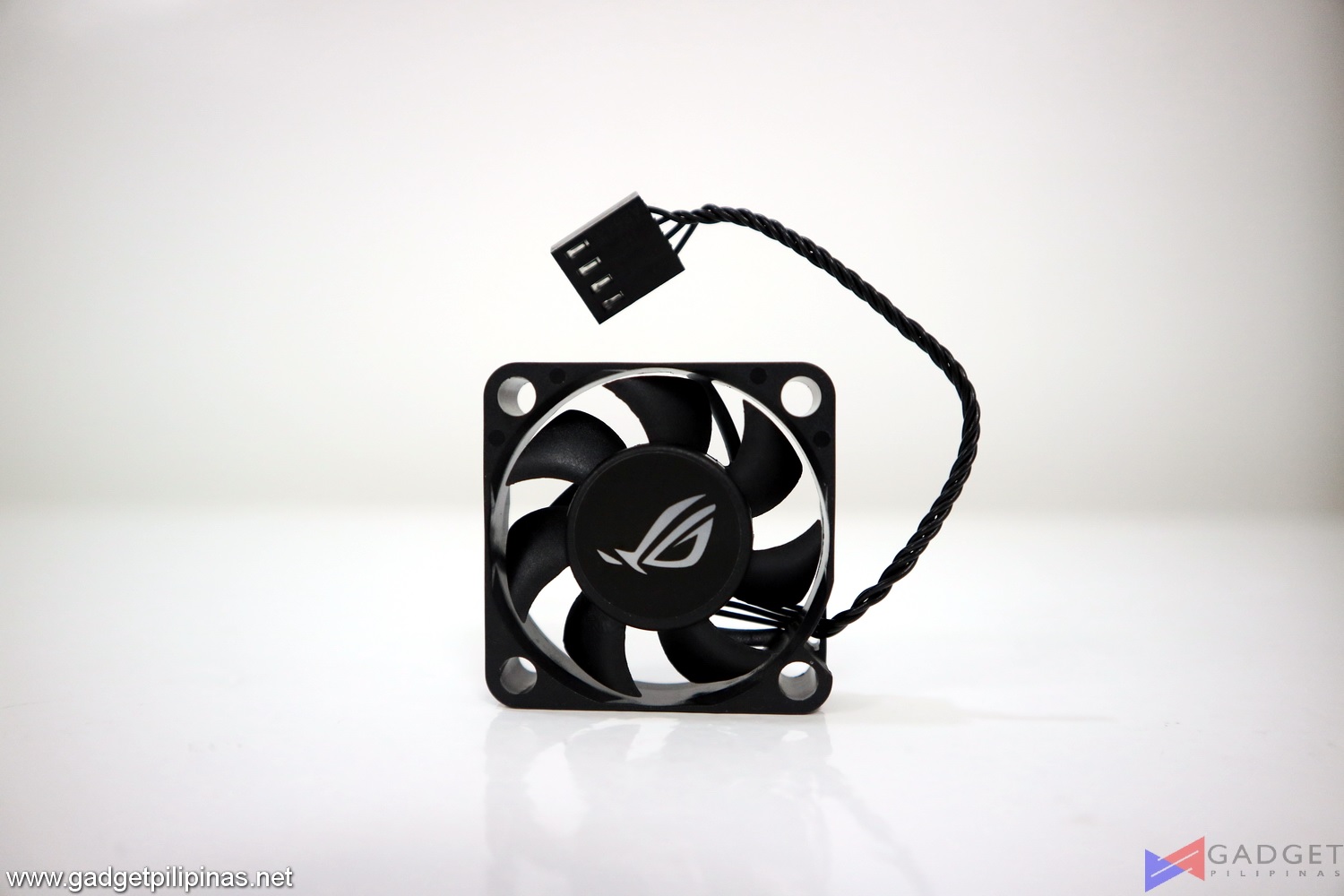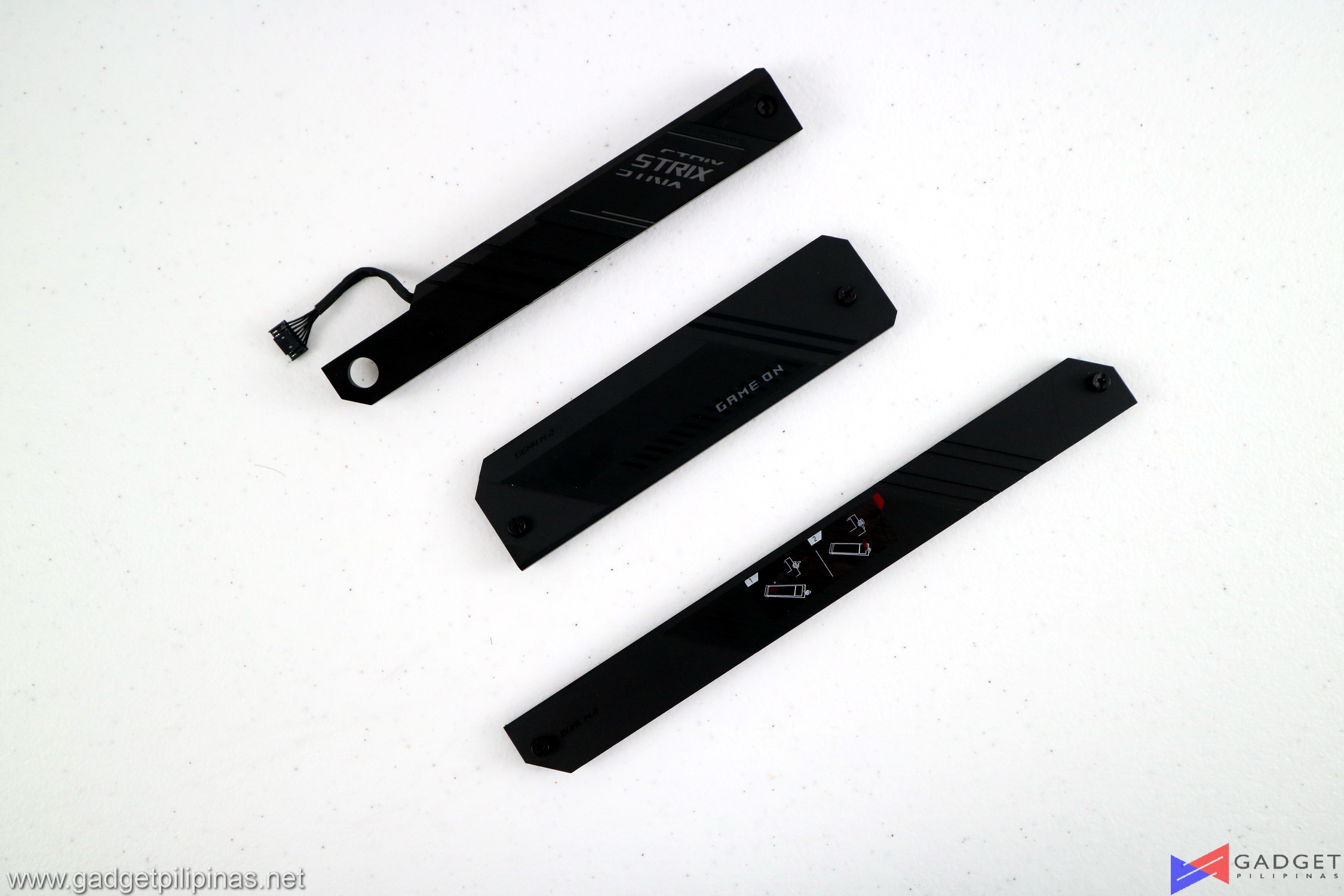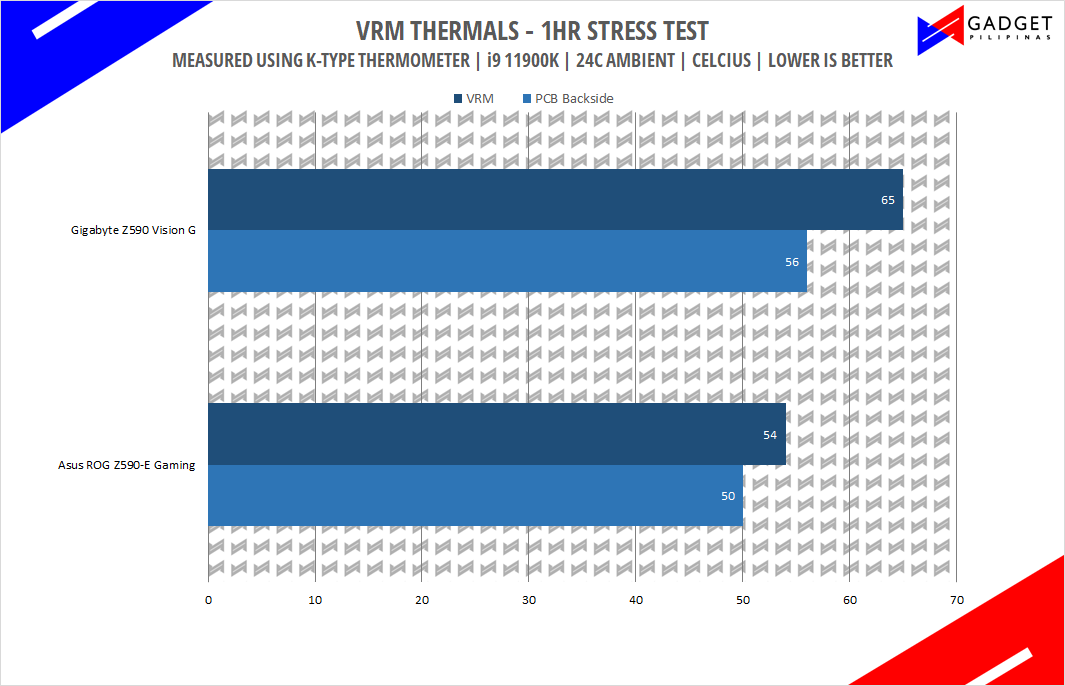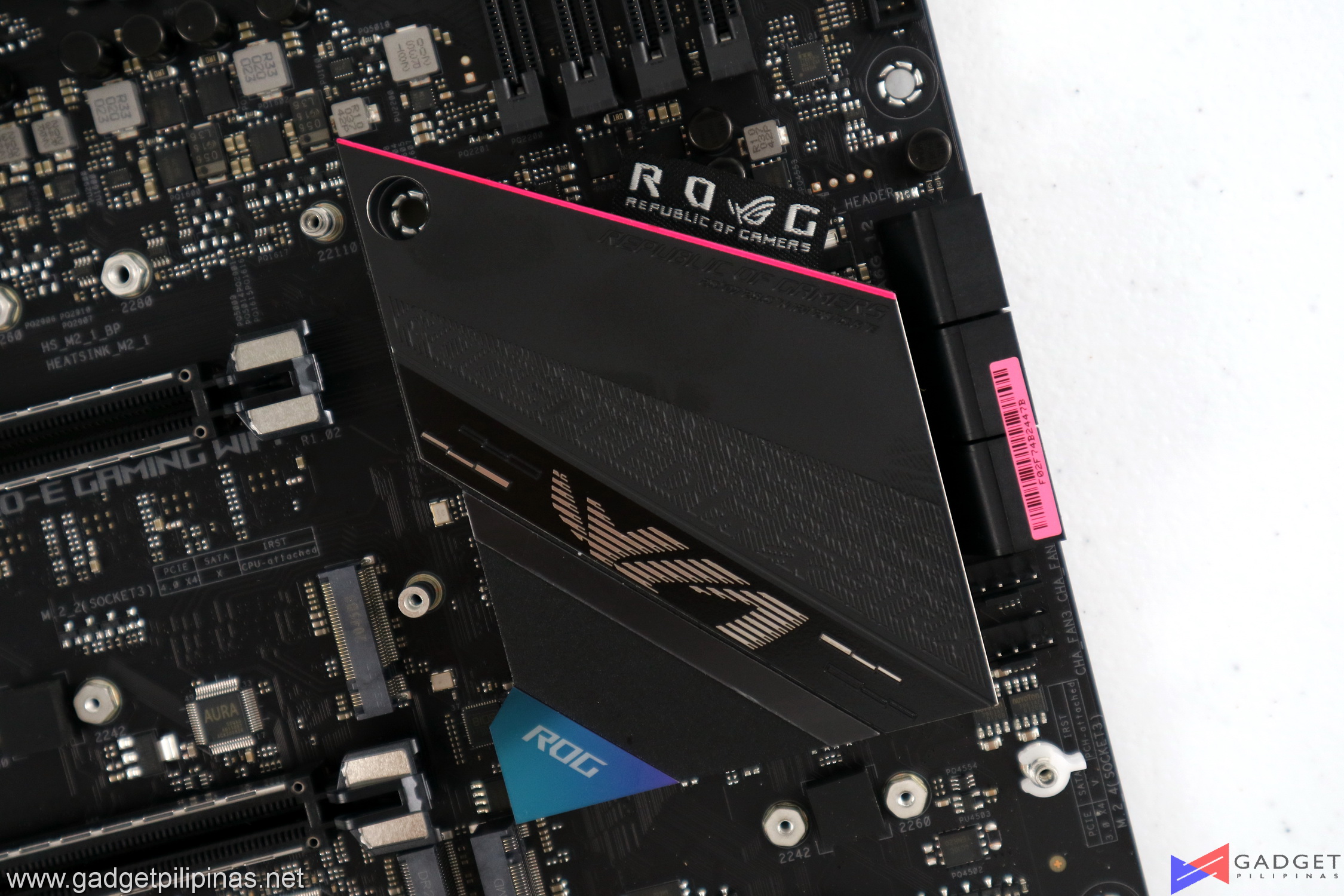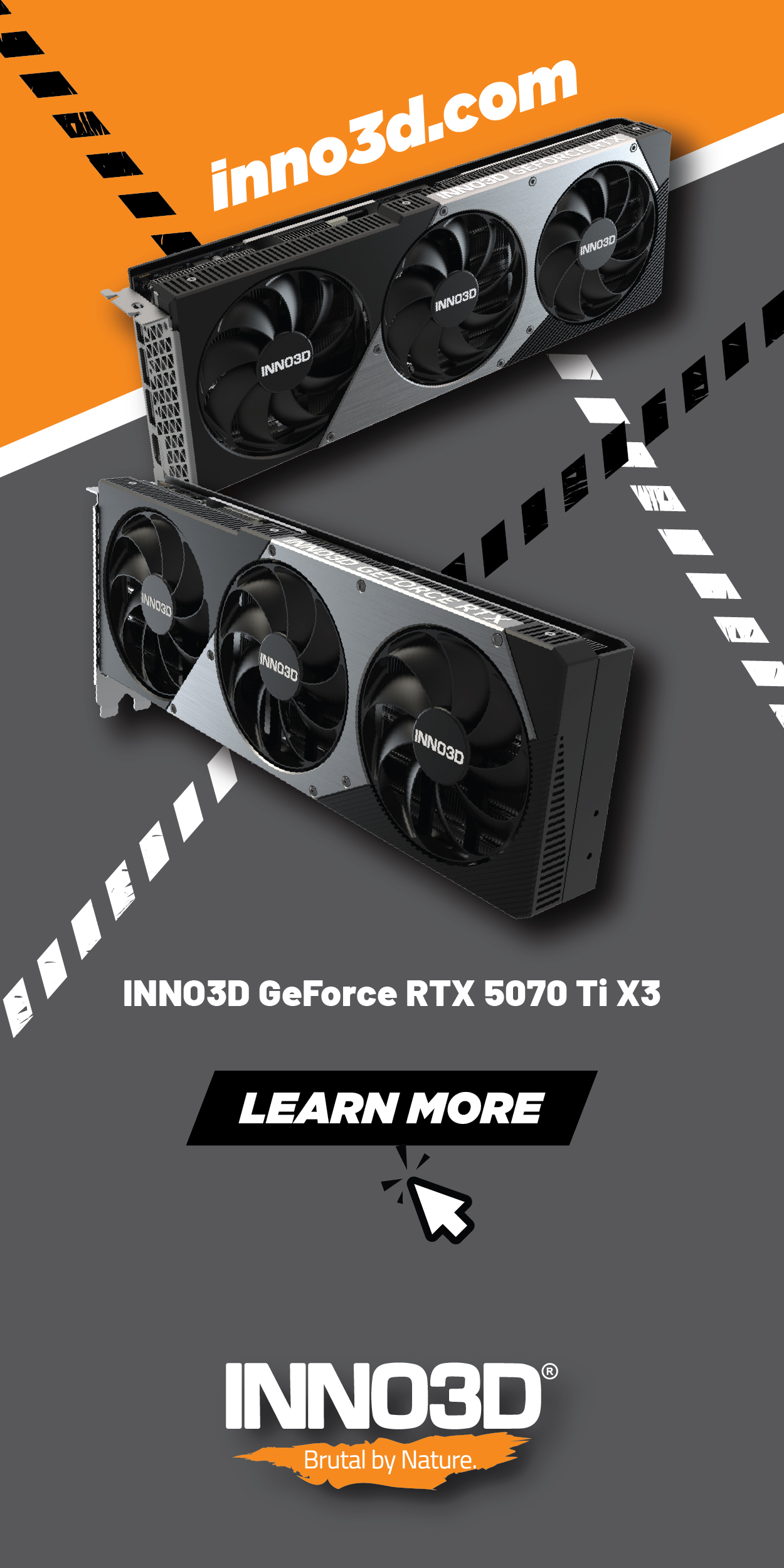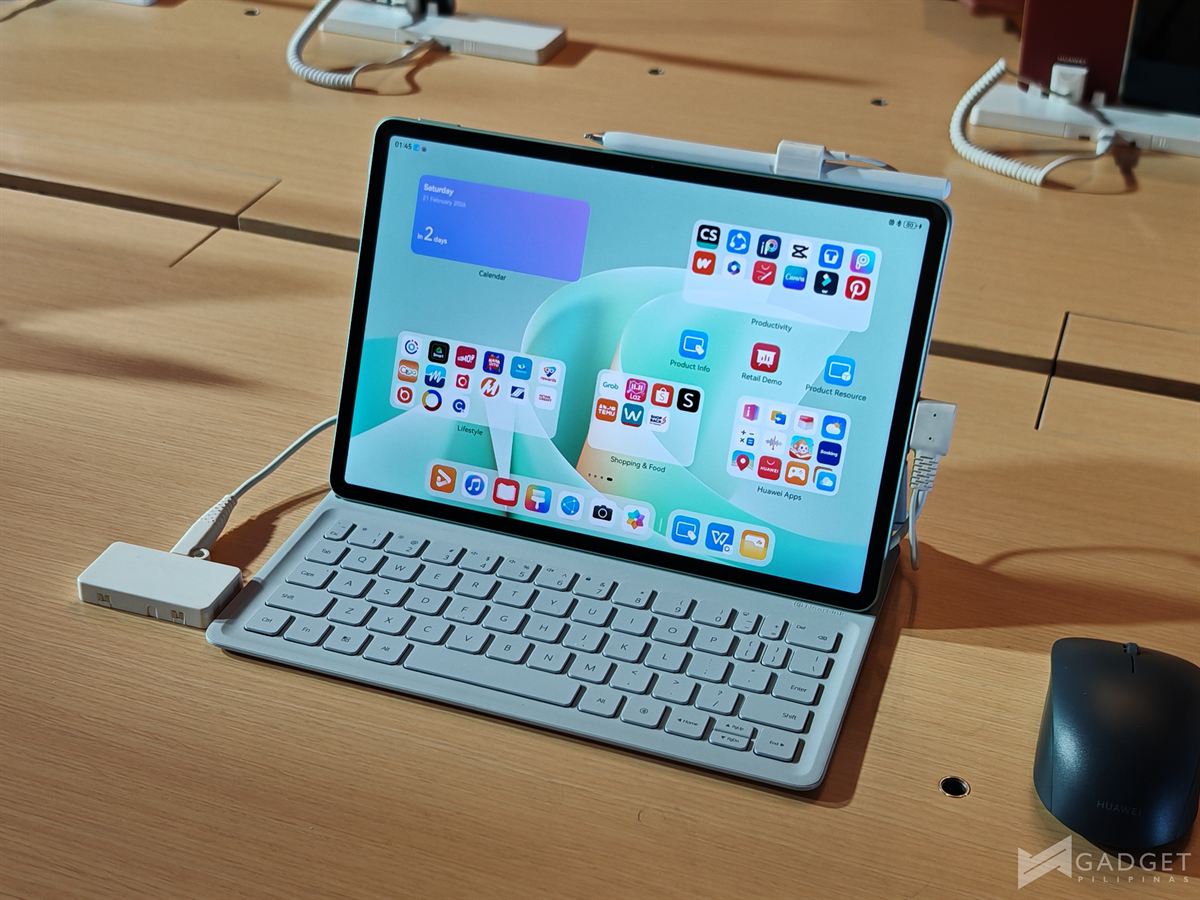Introduction
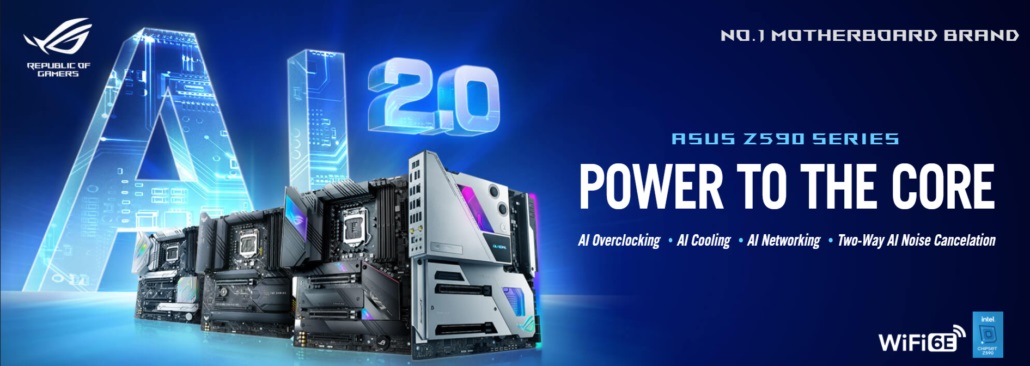 ASUS’ continuous refinement of its ROG Strix motherboards reached a point where Maximus and Crosshair motherboards remain relevant only for those looking for extra connectivity or robust VRM cooling. The full-fledged ROG Gaming motherboards contain abstruse features that only attract a certain number of people. ROG Strix A, E, F, G, H motherboards, on the other hand, contain relevant features for real-world usage and are more affordable which suits the needs of most enthusiasts. The latest ROG Strix Z590-E motherboard’s mix of performance and features dances in the thin line between just right and overkill. It certainly looks like the ROG Strix Z590-E cannibalizes the Maximus line thanks to a few upgrades over the ROG Z490-E namely Wifi 6E, PCIe 4.0 support, and full AI implementation.
ASUS’ continuous refinement of its ROG Strix motherboards reached a point where Maximus and Crosshair motherboards remain relevant only for those looking for extra connectivity or robust VRM cooling. The full-fledged ROG Gaming motherboards contain abstruse features that only attract a certain number of people. ROG Strix A, E, F, G, H motherboards, on the other hand, contain relevant features for real-world usage and are more affordable which suits the needs of most enthusiasts. The latest ROG Strix Z590-E motherboard’s mix of performance and features dances in the thin line between just right and overkill. It certainly looks like the ROG Strix Z590-E cannibalizes the Maximus line thanks to a few upgrades over the ROG Z490-E namely Wifi 6E, PCIe 4.0 support, and full AI implementation.
ASUS ROG Strix Z590-E Gaming Motherboard Specs
| Socket | LGA 1200 |
|---|---|
| Chipset | Z490 |
| Form Factor | ATX |
| Voltage Regulator | 16 Phase (14+2) 70A, Teamed |
| Video Ports | (1) HDMI 2.0 ,(1) DisplayPort (1.4) |
| REAR USB Ports | 1 x USB 3.2 Gen 2×2 port(s) (1 x USB Type-C), 3 x USB 3.2 Gen 2 port (2 x Type-A, 1 x USB Type-C ), 4 x USB 3.2 Gen 1 port (4 x Type-A), 2 x USB 2.0 port(s)(2 x Type-A) |
| Network Jacks | (2) Intel I225-V 2.5Gb Ethernet |
| Audio Jacks | (5) Analog + SPDIF |
| Legacy Ports/Jacks | ✗ |
| Other Ports/Jack | Wi-Fi Antenna + BT |
| PCIe x16 | 2 x PCIe 4.0/3.0 x16 (x16, x8/x8, x8/x4) + 1 x PCIe 3.0 x16 (max. x4) |
| PCIe x8 | ✗ |
| PCIe x4 | ✗ |
| PCIe x1 | (2) v3.0 (x1) |
| CrossFire/SLI | AMD 3/2 Way CrossFireX and Nvidia 2-Way SLI |
| DIMM slots | (4) DDR4 – DDR4 5333(OC) |
| M.2 slots | Supports 4 x M.2 – 4th slot supports PCIe 3.0 x4 & SATA modes |
| U.2 Ports | ✗ |
| SATA Ports | (6) SATA3 6 Gbps |
| USB Headers | 1 x USB 3.2 Gen 2×2 connector(s) (suppport(s) USB Type-C),
1 x USB 3.2 Gen 1 header(s) support(s) additional 2 USB 3.2 Gen 1 ports, 2 x USB 2.0 header(s) support(s) additional 4 USB 2.0 ports |
| Fan/Pump Headers | (7) 4-Pin |
| RGB Headers | (2) Aura Addressable RGB (3-pin), (2) Aura RGB (4-pin) |
| Legacy Interfaces | ✗ |
| Other Interfaces | FP-Audio, TPM |
| Diagnostics Panel | Yes |
| Internal Button/Switch | ✗ |
| SATA Controllers | ✗ |
| Ethernet Controllers | (1) Intel I225-V (2.5 GbE) |
| Wi-Fi / Bluetooth | Intel AX210 / BT 5.1 |
| USB Controllers | ✗ |
| HD Audio Codec | SupremeFX S1220A + Savitech SV3H712 Amplifier |
| DDL/DTS Connect | ✗/ DTS Sound Unbound |
| Warranty | 3 Years |
Z590 Chipset Overview
| Chipset | Z590 | Z490 |
| Supported CPUs | 10th Gen Intel Core Processors | 10th Gen Intel Core Processors |
| 11th Gen Intel Core Processors | 11th Gen Intel Core Processors | |
| Chipset Link | DMI x8 (11th Gen only) | DMI x4 |
| PCIE Lanes(CPU) | 20 | 16 |
| PCIE Specification(CPU) | 4 | 3 |
| PCIe Config | x16,x8/x8, x8/x8/x4+4 | x16,x8/x8, x8/x8/x4 |
| PCIe 3.0 lanes | 24 | 24 |
| SATA 6.0 Gb/s Ports | 6 | 6 |
| USB 3.2 Gen 2×2 (20Gb/s) Ports | 3 | 0 |
| USB 3.2 Gen 2×1 (10Gb/s) Ports | 10 | 6 |
| USB 3.2 Gen 1×1 (5Gb/s) Ports | 10 | 10 |
| USB 2.0 Ports | 14 | 14 |
The Z590 chipset supports both 10th Gen and 11th Gen Intel Core processors. Z590 chipset motherboards generally have more connectivity versus Z490. The main difference being PCI-E 4.0 support but it will only work if the Z590 motherboard is paired with an 11th Gen processor.
ASUS ROG Strix Z590-E Gaming Unboxing and First Impressions
- ASUS ROG Z590 E Gaming Motherboard Review 054
- ASUS ROG Z590 E Gaming Motherboard Review 054
- ASUS ROG Z590 E Gaming Motherboard Review 055
- ASUS ROG Z590 E Gaming Motherboard Review 055
The ASUS ROG Z590-E Gaming Wifi motherboard veers off the traditional ROG Strix packaging with the RGB ROG Strix logo. It feels similar to the recently launched ROG Zephyrus lineup with a distinct slash. Features and key specifications are highlighted on the backside which is easier to read compared to the Z490-E’s packaging.
ACCESSORIES LIST
- User’s manual
- 1 x ASUS Fan Holder
- 4 x SATA 6Gb/s cables
- 1 x Supporting DVD
- 1 x MOS Cooling kit (fan bracket and 1x 40mm fan)
- x ROG Strix stickers
- 1 x Cable ties pack
- 1 x Extension Cable for RGB strips (80 cm)
- 1 x Extension cable for Addressable LED
- 1 x Thermistor cable
- 1 x ROG Thank you card
- 1 x 2-in-1 Rubber pad
- 1 x Wi-Fi 6E moving antenna
- 1 M.2 SSD screw package
- 1 ROG key chain
The ROG Strix Z590-E Gaming Wifi features a less aggressive cyberpunk dystopian design which makes the motherboard look and feels more premium. At a glance, the most noticeable improvement over the Z490-E is the clear separation of the M.2 heatsink and the Z590 chipset heatsink. This is a clear step-up of previous generation ROG Strix motherboards, including AMD variants as users don’t go through the ordeal of having to remove the chipset heatsink to access an M.2 SSD slot.
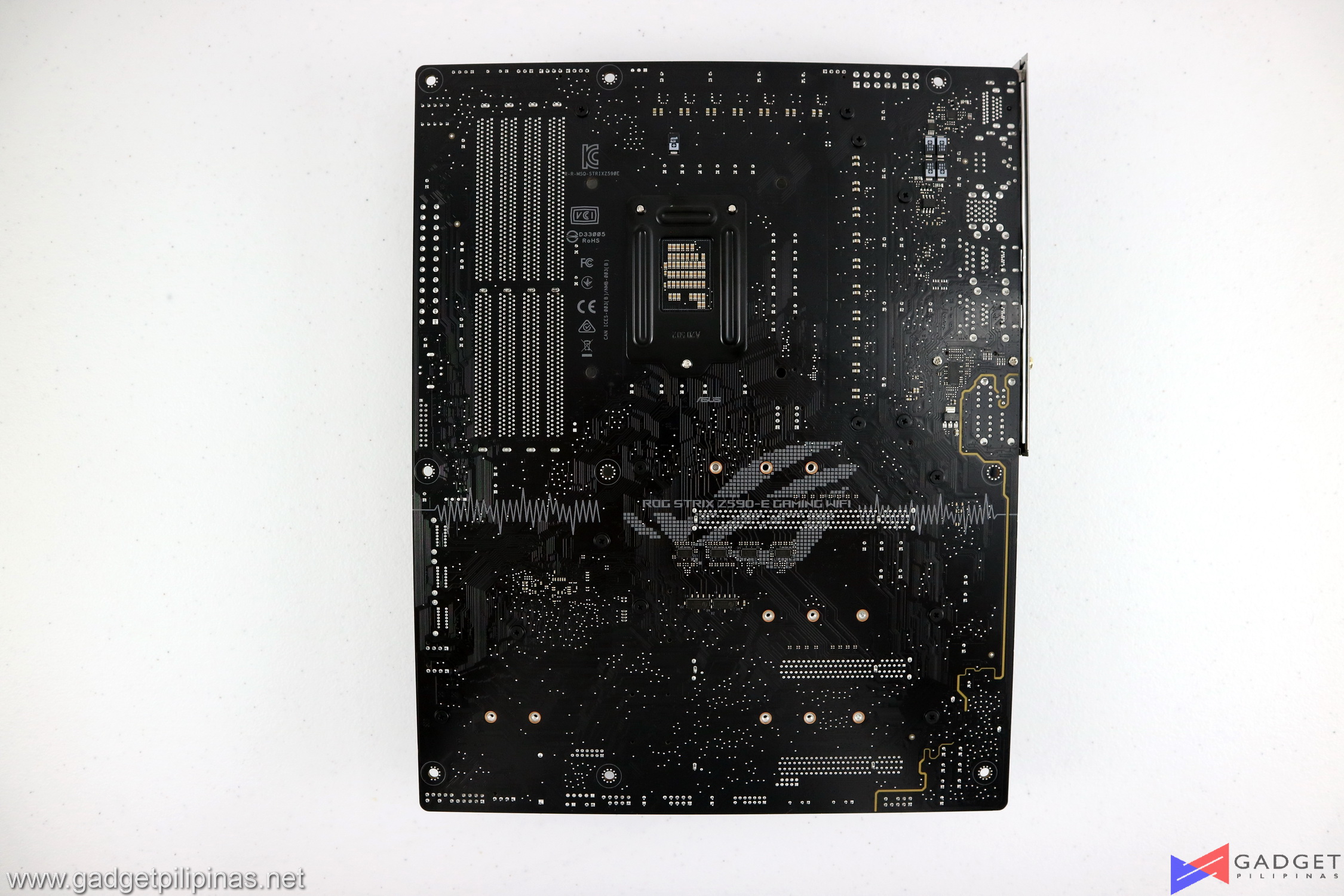 There’s not much going on at the backside of the motherboard PCB except for the clean and premium solder work. Like the Z490-E variant, it also uses 2-oz copper across six PCB layers for overall system stability and build quality.
There’s not much going on at the backside of the motherboard PCB except for the clean and premium solder work. Like the Z490-E variant, it also uses 2-oz copper across six PCB layers for overall system stability and build quality.
Another similar feature found on the Z490-E that carried over to the Z590-E is the ProCool II power connectors that reinforce the contact between the solid-core pins and PSU cables.
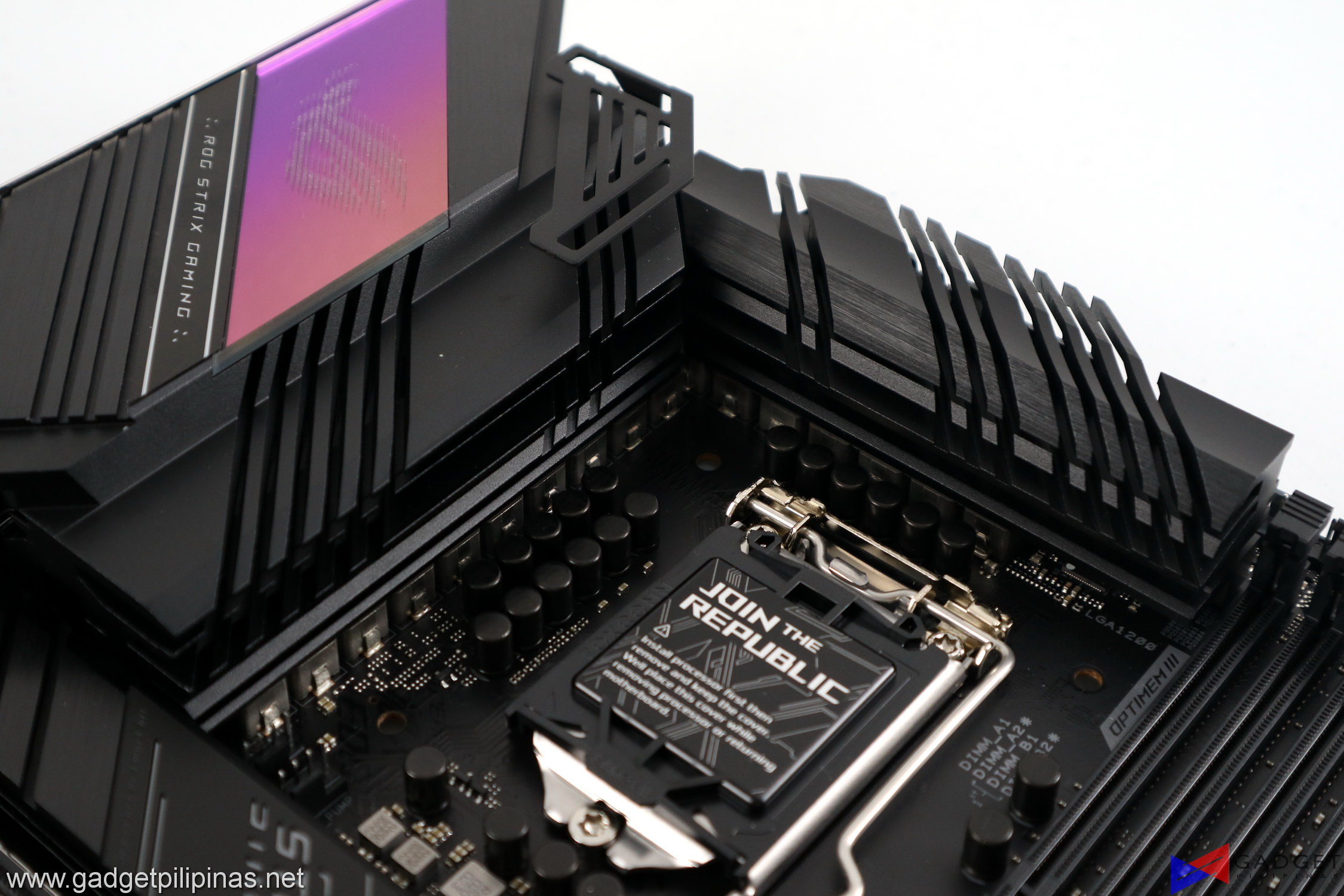 ASUS is known for using teamed power architecture for all of its ROG motherboards and the latest ASUS ROG Strix Z590-E is no exception. Moreover, ASUS used fewer fins on the Z590 VRM heatsinks, especially on the left side.
ASUS is known for using teamed power architecture for all of its ROG motherboards and the latest ASUS ROG Strix Z590-E is no exception. Moreover, ASUS used fewer fins on the Z590 VRM heatsinks, especially on the left side.
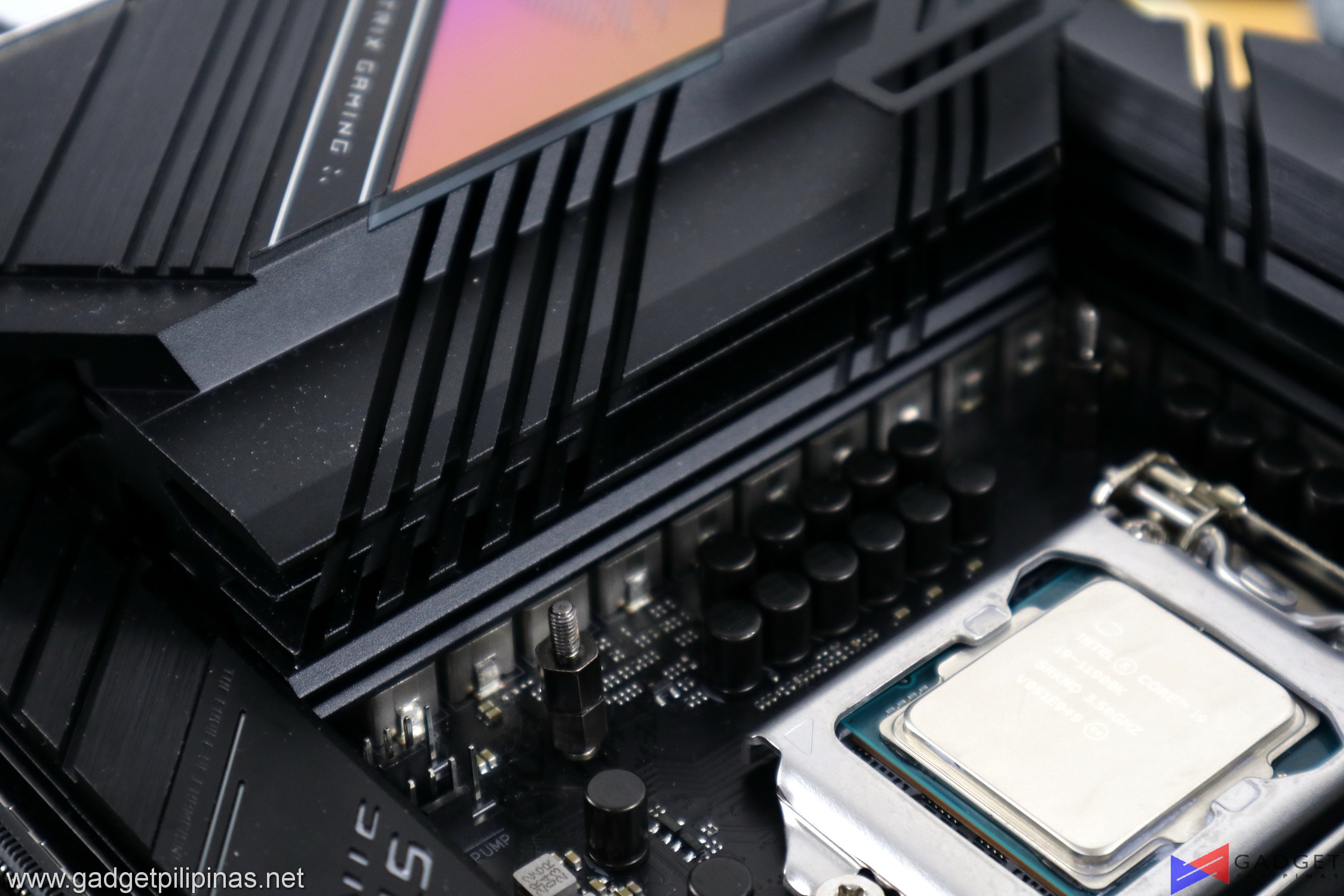 The main difference between an ROG Strix-E board compared to the rest of the ROG Strix lineup is its VRM configuration. Previously, the ROG Strix-E boards have at least two more power stages than the rest of the ROG Strix but that is no longer the case for the Z590 series. Instead, the whole ROG Strix lineup, with the exception of ITX variant, uses the same 14+2 power stage design. The ROG Strix-E differs itself this time by having 70A variants compared to the 50A installed on the Strix Z590 boards and even the Z490-E.
The main difference between an ROG Strix-E board compared to the rest of the ROG Strix lineup is its VRM configuration. Previously, the ROG Strix-E boards have at least two more power stages than the rest of the ROG Strix but that is no longer the case for the Z590 series. Instead, the whole ROG Strix lineup, with the exception of ITX variant, uses the same 14+2 power stage design. The ROG Strix-E differs itself this time by having 70A variants compared to the 50A installed on the Strix Z590 boards and even the Z490-E.
ASUS still includes a 40MM fan together with the MOS fan bracket providing the user the options of actively cooling the motherboard VRM.
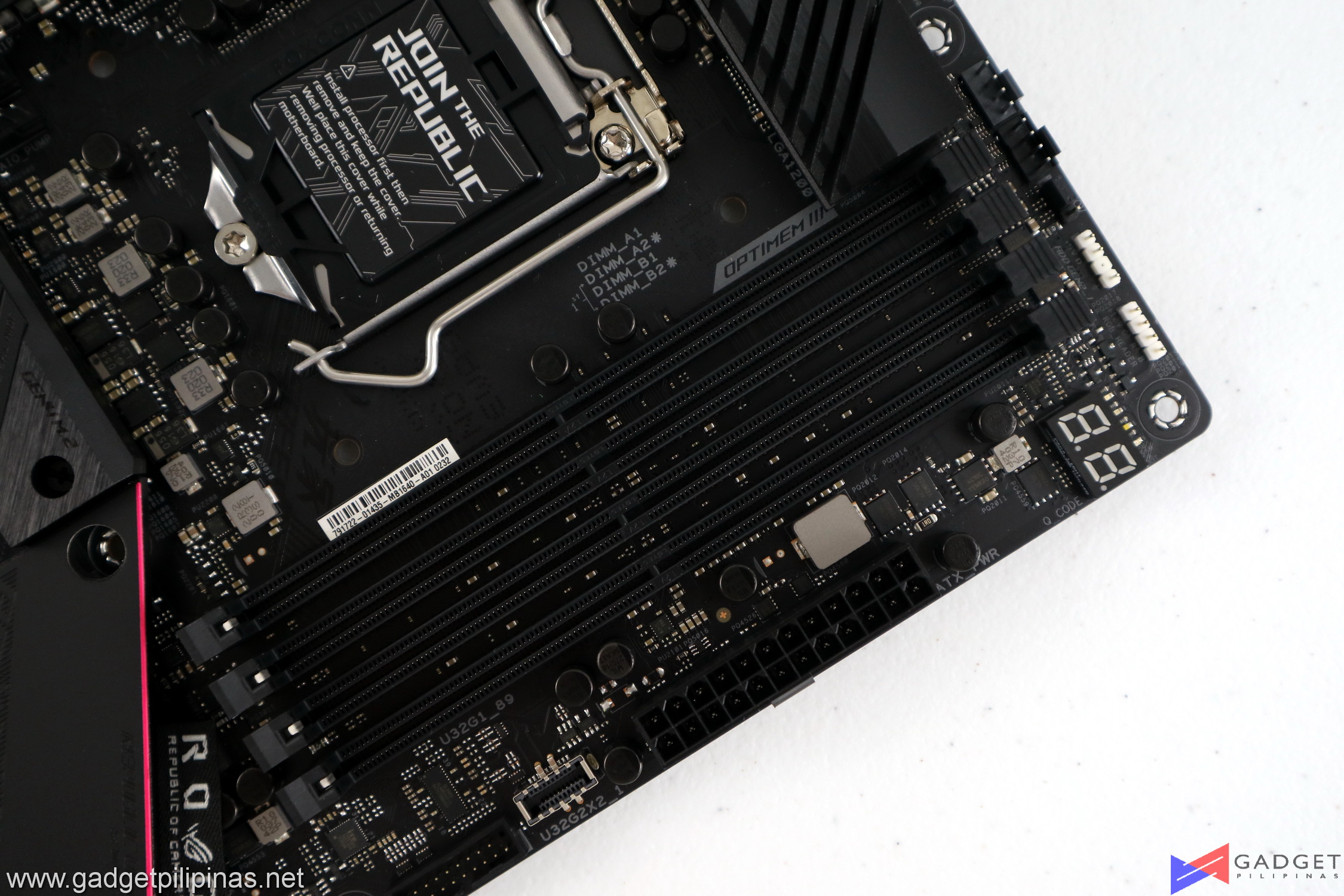 The previous Z490-E motherboard supported DDR4 speeds up to 4,800MHz whereas the ROG Strix Z590-E Gaming Wifi supports DDR4 5,333MHz(OC). The ROG Z590-E still uses a daisy chain trace design instead of T-Tpology. A Daisy Chain trace design is able to achieve a higher peak frequency by reducing signal and reflection as it enhances compatibility, performance, and the overclocking margin of one DIMM per margin.
The previous Z490-E motherboard supported DDR4 speeds up to 4,800MHz whereas the ROG Strix Z590-E Gaming Wifi supports DDR4 5,333MHz(OC). The ROG Z590-E still uses a daisy chain trace design instead of T-Tpology. A Daisy Chain trace design is able to achieve a higher peak frequency by reducing signal and reflection as it enhances compatibility, performance, and the overclocking margin of one DIMM per margin.
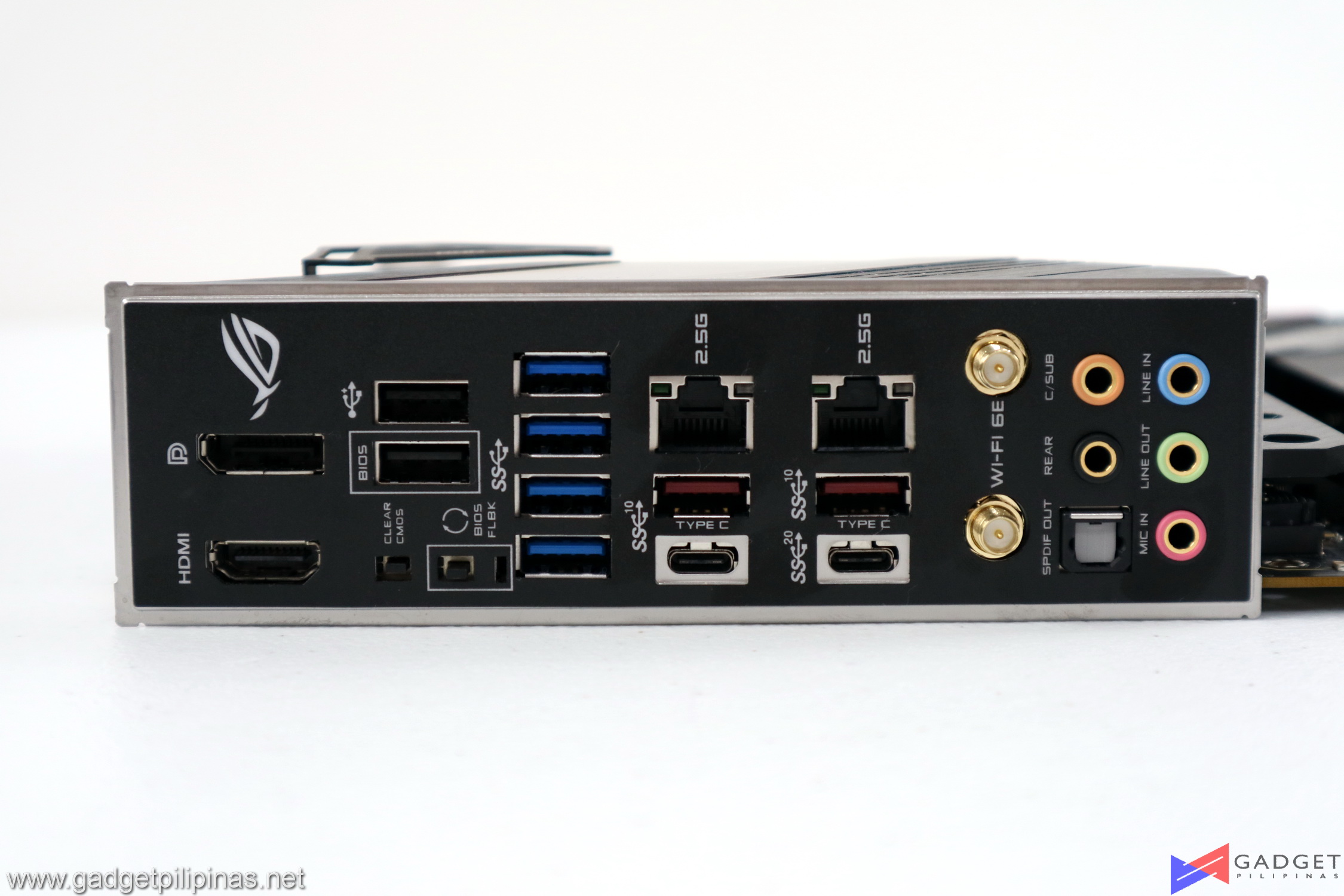 The Z590 chipset boasts more connectivity with almost double the native 3.2 Gen 1 ports as well as support for three USB 3.2 Gen 2 ports. There are four 3.2 USB Gen 1 ports, three 3.2 Gen 2 ports one of which is a type-c port, two USB 2.0 ports, and a single USB 3.2 Gen2x2 Type-C port. One of the USB 2.0 ports supports ASUS’ proprietary EZ Flash Utility. Apart from the traditional audio, HDMI, and Display ports, the rear IO panel has a BIOS flashback button as well as a clear CMOS button. The Wi-Fi module is also upgraded and now uses the Intel AX210 which supports WiFi 6E. Compared to the Z590-F, the ROG Strix Z590-E has an additional Intel 2.5GbE ethernet port.
The Z590 chipset boasts more connectivity with almost double the native 3.2 Gen 1 ports as well as support for three USB 3.2 Gen 2 ports. There are four 3.2 USB Gen 1 ports, three 3.2 Gen 2 ports one of which is a type-c port, two USB 2.0 ports, and a single USB 3.2 Gen2x2 Type-C port. One of the USB 2.0 ports supports ASUS’ proprietary EZ Flash Utility. Apart from the traditional audio, HDMI, and Display ports, the rear IO panel has a BIOS flashback button as well as a clear CMOS button. The Wi-Fi module is also upgraded and now uses the Intel AX210 which supports WiFi 6E. Compared to the Z590-F, the ROG Strix Z590-E has an additional Intel 2.5GbE ethernet port.
- ASUS ROG Strix Z590 E Gaming Motherboard Review PCIE
- ASUS ROG Strix Z590 E Gaming Motherboard Review PCIE
- ASUS ROG Strix Z590 E Gaming Motherboard Review SATA
- ASUS ROG Strix Z590 E Gaming Motherboard Review SATA
Two out of three PCI-E x16 slots support PCI-E Gen 4 and Nvidia SLI and AMD Crossfire. The PCI-E Gen-4 x16 slots are reinforced by steel per Gen 4 standards. Moreover, there’s a total of four M.2 slots on the Z590-E. The first two slots support Gen 4 M.2 SSDS, the 3rd and fourth slots support PCI-E 3.0 with the fourth slot being the only one that supports SATA M.2 SSDs. Do note that the PCI-E slots will only run on Gen 4 mode if you are using an Intel 11th Generation Rocket Lake-S CPU. Additionally, one of the six SATA ports will be disabled if the fourth M.2 slot is occupied by a SATA SSD.
- ASUS ROG Z590 E Gaming Motherboard Review 058
- ASUS ROG Z590 E Gaming Motherboard Review 058
- ASUS ROG Strix Z590 E Gaming Motherboard Review No Heatsink
- ASUS ROG Strix Z590 E Gaming Motherboard Review No Heatsink
The bottom half of the ASUS ROG Strix Z590-E is mainly covered by three M.2 heatsinks with varying lengths and thicknesses. As mentioned earlier, users no longer have to remove the Z590 chipset to access any of the M.2 slots.
Interestingly, both M.2 slots that support Gen 4 SSDs have thicker heatsinks compared to the shared long heatsink of the last two slots. The first heatsink has integrated AURA lighting which requires the cable to be disconnected every time you install or remove an SSD.
- ASUS ROG Strix Z590 E Gaming Motherboard Review QLatch
- ASUS ROG Strix Z590 E Gaming Motherboard Review QLatch
- ASUS ROG Strix Z590 E Gaming Motherboard Review Q Latch
- ASUS ROG Strix Z590 E Gaming Motherboard Review Q Latch
With the launch of the 11th Gen Intel Core processors and Z590 motherboards, ASUS introduced a new feature only found on ROG Z590 motherboards
One of the most distinct and premium features of the ROG Strix Z590 lineup is the Q-Latch design. Q-Latch removes the need to use a screw to hold an M.2 SSD in place. Instead, it uses a simple yet clever locking mechanism to secure the SSD removing the ordeal of screwing and potentially losing your M.2 screw. All except the first M.2 slot supports Q-Latch albeit limited to 80mm and 110mm SSD lengths.
Benchmark Setup and Methodology
Gadget Pilipinas’ testing philosophy is to provide detail-oriented results as accurately as possible that our readers can replicate our tests given that these conditions are met. Different benchmarking apps and sequences are used depending on the component or device being tested.
| ASUS ROG Strix Z590-E Motherboard Review Test Bench Specs | |||
| CPU | Intel Core i9 11900K | ||
| COOLER | Corsair H100i RGB Pro XT – Noctua NT-H2 Thermal Paste | ||
| MOTHERBOARD | ASUS ROG Strix Z590-E Gaming Motherboard | Gigabyte Z590 Vision G Motherboard | |
| MEMORY | TForce XTREEM ARGB 16GB(8GBx2) 3600Mhz DDR4 | ||
| GPU | Palit RTX 3080 Gaming Pro | ||
| STORAGE | TForce CARDEA Liquid NVMe SSD | ||
| POWERSUPPLY | ThermalTake ToughPower 1200w Platinum | ||
| OPERATING SYSTEM | Windows 10 Pro Build 2404 | ||
| DISPLAY | Lenovo Legion Y27Q Gaming Monitor | ||
We use CapFrameX as our FPS capture and analysis tool for all our gaming benchmarks. The latest build version of Windows 10 and WHQL certified drivers are used for our benchmarks. Readings such as temperatures and power draw are recorded using HWMonitor and HWInfo64 as well as other relevant software used for cross-checking.
- Cinebench R20
- V-Ray
- HWBot x265
- Handbrake
- Blender
- Corona Renderer
- Super PI – 32M Calculations
- wPrime –1024M Calculation
ASUS ROG Strix Z590-E Benchmarks
SuperPI 32M
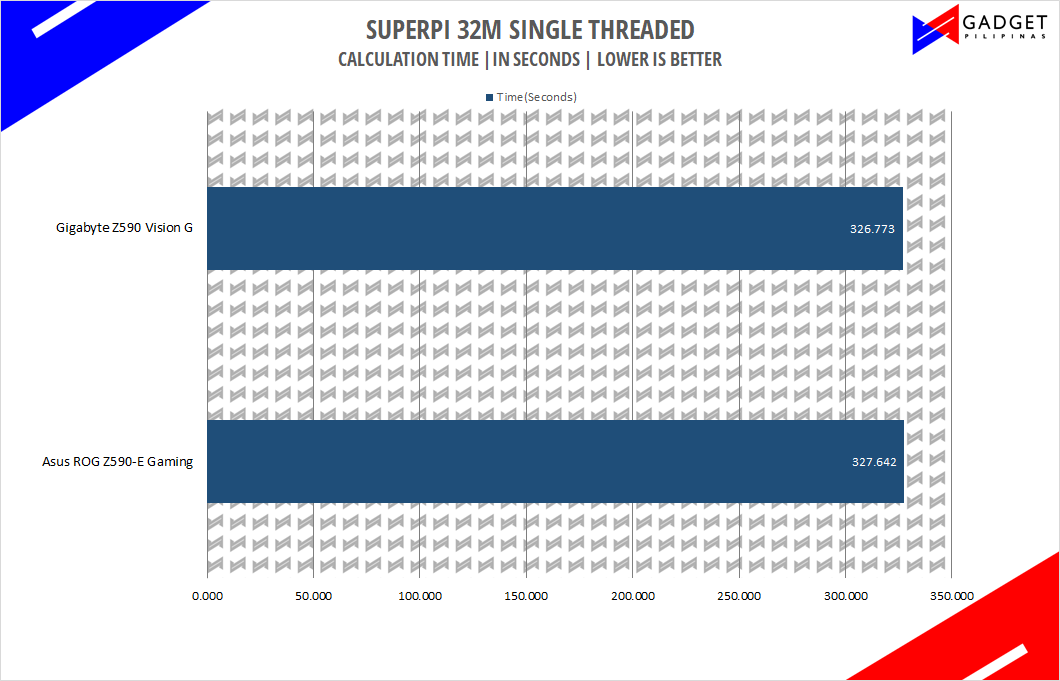 SuperPI is a single-threaded benchmark application that lets the CPU calculate Pi(π) to the nth digit. In this benchmark, we selected the Pi calculation to 32M, the highest available for the app.
SuperPI is a single-threaded benchmark application that lets the CPU calculate Pi(π) to the nth digit. In this benchmark, we selected the Pi calculation to 32M, the highest available for the app.
wPrime 1024M
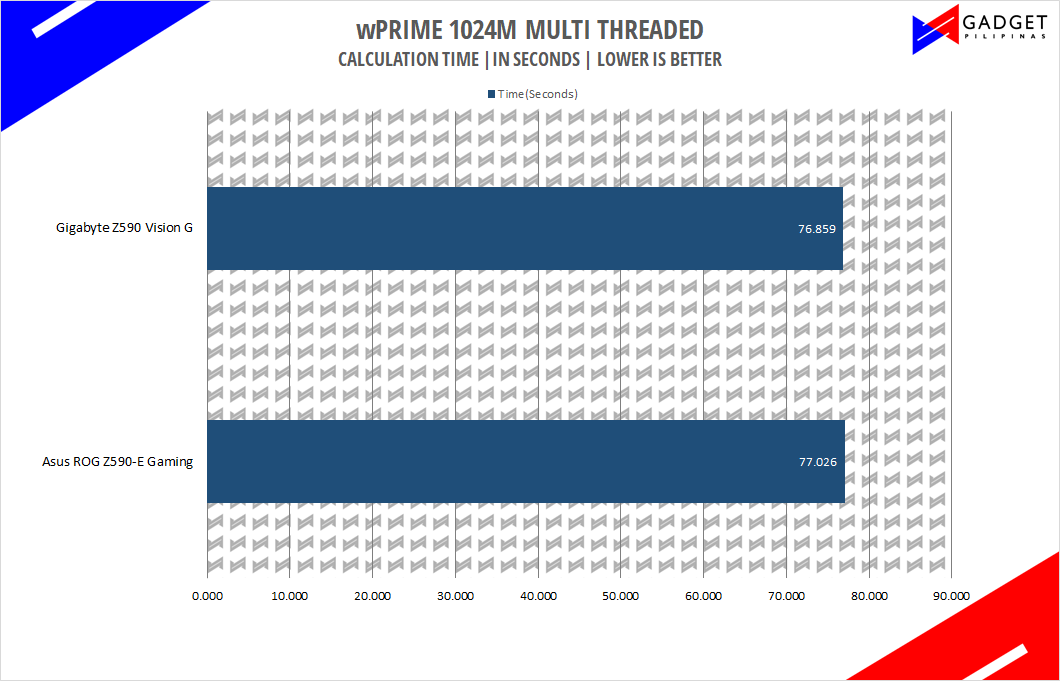 wPrime is a benchmark tool similar to SuperPI, but the former takes on finding prime numbers using Newton’s Method. The benchmark is set to calculate 1024M, and measured according to calculation time.
wPrime is a benchmark tool similar to SuperPI, but the former takes on finding prime numbers using Newton’s Method. The benchmark is set to calculate 1024M, and measured according to calculation time.
GeekBench 5
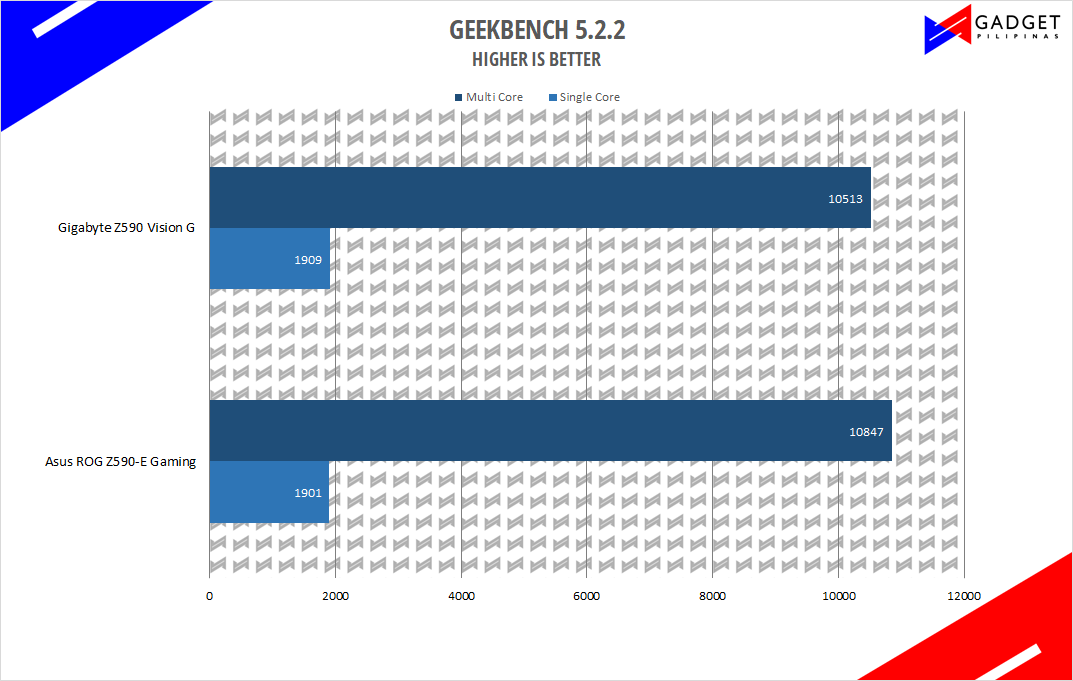 Geekbench is a multi-platform benchmark that’s used to gauge CPU performance and compare them across Windows, Mac, and Mobile. Geekbench 5 is the latest version and doesn’t rely on memory as much compared to the previous Geekbench 4, making it a great tool to measure both single-core and multi-core CPU performance.
Geekbench is a multi-platform benchmark that’s used to gauge CPU performance and compare them across Windows, Mac, and Mobile. Geekbench 5 is the latest version and doesn’t rely on memory as much compared to the previous Geekbench 4, making it a great tool to measure both single-core and multi-core CPU performance.
CINEBENCH R20
- Asus ROG Z590 E Gaming Review Cinebench R20 Benchmark
- Asus ROG Z590 E Gaming Review Cinebench R20 Benchmark
- Asus ROG Z590 E Gaming Review Cinebench R23 Benchmark
- Asus ROG Z590 E Gaming Review Cinebench R23 Benchmark
Maxon’s Cinebench benchmark is one of the most iconic benchmark applications used by reviewers and enthusiasts. The latest Cinebench R20 uses the latest rendering architectures, including Intel’s Embree ray tracing technology and other advanced features from AMD and Intel that allow users to render the same scene on the same hard. Cinebench R20 uses a larger and more complex testing scene than Cinebench R20 by about 8x computational power and requires 4x the memory.
V-RAY
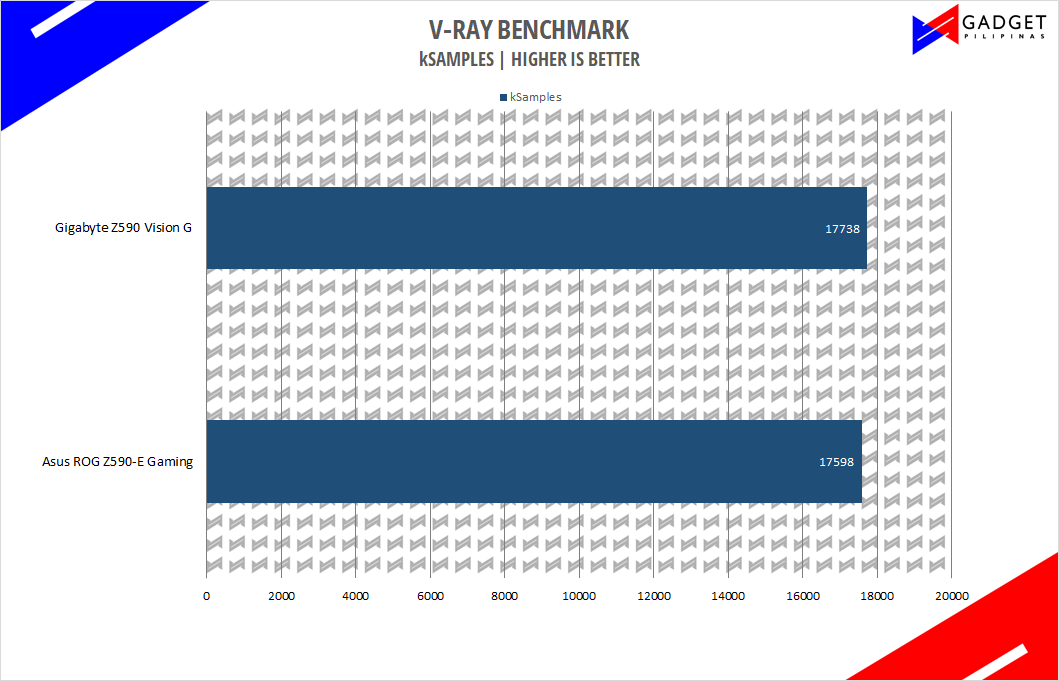 V-Ray Benchmark is a stand-alone version of V-Ray developed by Chaos Group. It is designed to test the CPU and GPU by rendering sample scenes at a fixed amount of time. V-Ray is a plug-in mostly utilized by 3D computer graphics software applications mainly for industrial design, product design, architecture, film, and video game production. V-Ray is not limited to 64-threads as it supports multi and mega-threading.
V-Ray Benchmark is a stand-alone version of V-Ray developed by Chaos Group. It is designed to test the CPU and GPU by rendering sample scenes at a fixed amount of time. V-Ray is a plug-in mostly utilized by 3D computer graphics software applications mainly for industrial design, product design, architecture, film, and video game production. V-Ray is not limited to 64-threads as it supports multi and mega-threading.
HWBOT x265
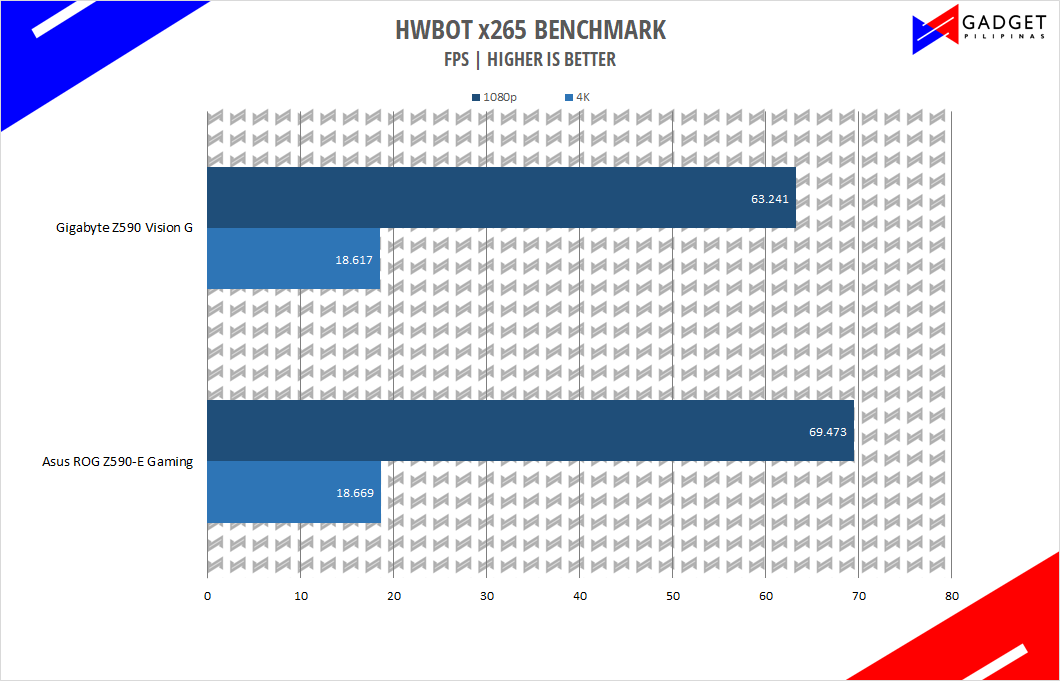 HWBOT x265, developed by Czech overclocker Havli, is a multi-threaded application that takes advantage of modern CPU instruction sets with support for older CPUs. HWBOT x265 benchmark uses the x265/HEVC encoder that renders a video in 1080p or 4K resolution.
HWBOT x265, developed by Czech overclocker Havli, is a multi-threaded application that takes advantage of modern CPU instruction sets with support for older CPUs. HWBOT x265 benchmark uses the x265/HEVC encoder that renders a video in 1080p or 4K resolution.
HANDBRAKE
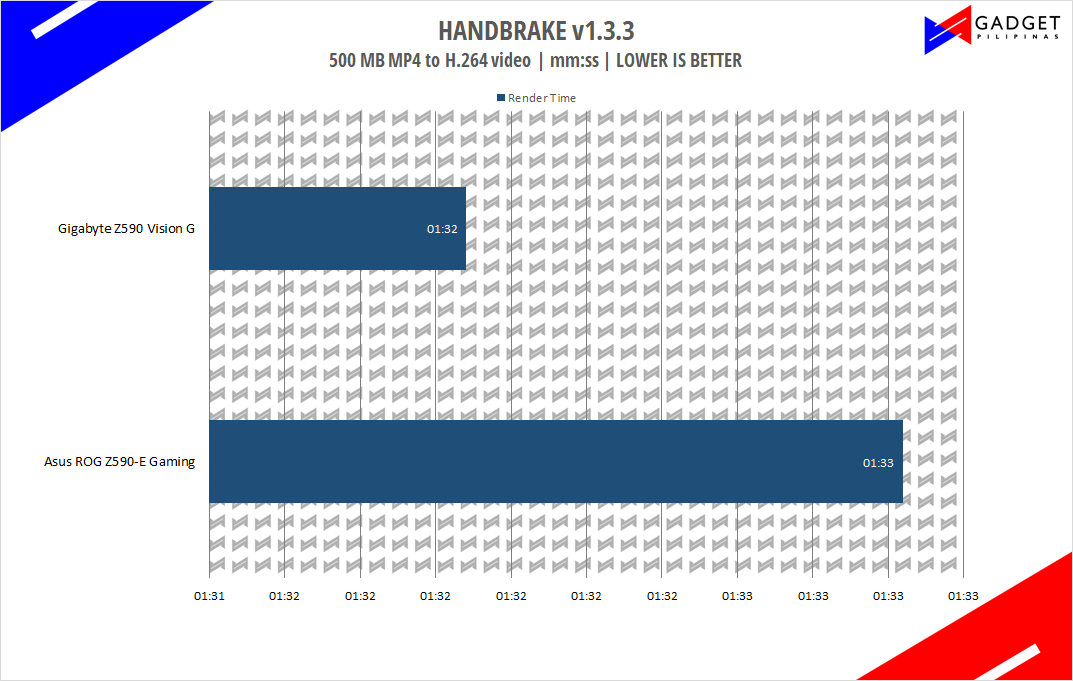 Handbrake is a top-rated open-source video conversion software that is used by professionals, enthusiasts, and even reviewers as a reference point mainly because of its wide variety of media codecs. The rise of streaming and blogging makes video content, both encoding, and transcoding necessary for these people, regardless if they’re seasoned professionals or just starting out. Handbrake also takes advantage of AVX-512 and OpenCL to accelerate certain types of media codecs. Our Handbrake benchmark converts a 500MB MP4 video to H.264 to measure the processor’s performance.
Handbrake is a top-rated open-source video conversion software that is used by professionals, enthusiasts, and even reviewers as a reference point mainly because of its wide variety of media codecs. The rise of streaming and blogging makes video content, both encoding, and transcoding necessary for these people, regardless if they’re seasoned professionals or just starting out. Handbrake also takes advantage of AVX-512 and OpenCL to accelerate certain types of media codecs. Our Handbrake benchmark converts a 500MB MP4 video to H.264 to measure the processor’s performance.
BLENDER
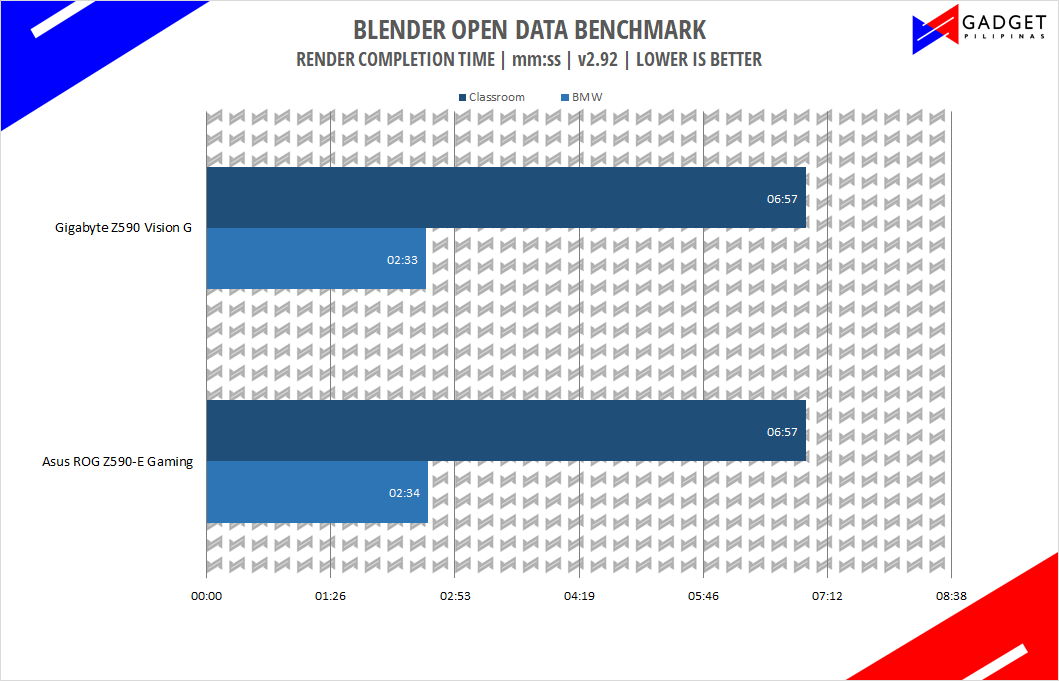 Blender is a widely used, free, open-source 3D creation suite. It supports the whole 3D pipeline process from modeling, rigging, animation, simulation, rendering, and even motion tracking. Blender has become a standard for CPU benchmarks with the BMW27 and Classroom scene most used. This prompted the company to release Blender Open Data Benchmark in 2018, a benchmark-specific version that allows users to run a preset benchmark and share the results online similar to 3D Mark.
Blender is a widely used, free, open-source 3D creation suite. It supports the whole 3D pipeline process from modeling, rigging, animation, simulation, rendering, and even motion tracking. Blender has become a standard for CPU benchmarks with the BMW27 and Classroom scene most used. This prompted the company to release Blender Open Data Benchmark in 2018, a benchmark-specific version that allows users to run a preset benchmark and share the results online similar to 3D Mark.
CORONA RENDERER
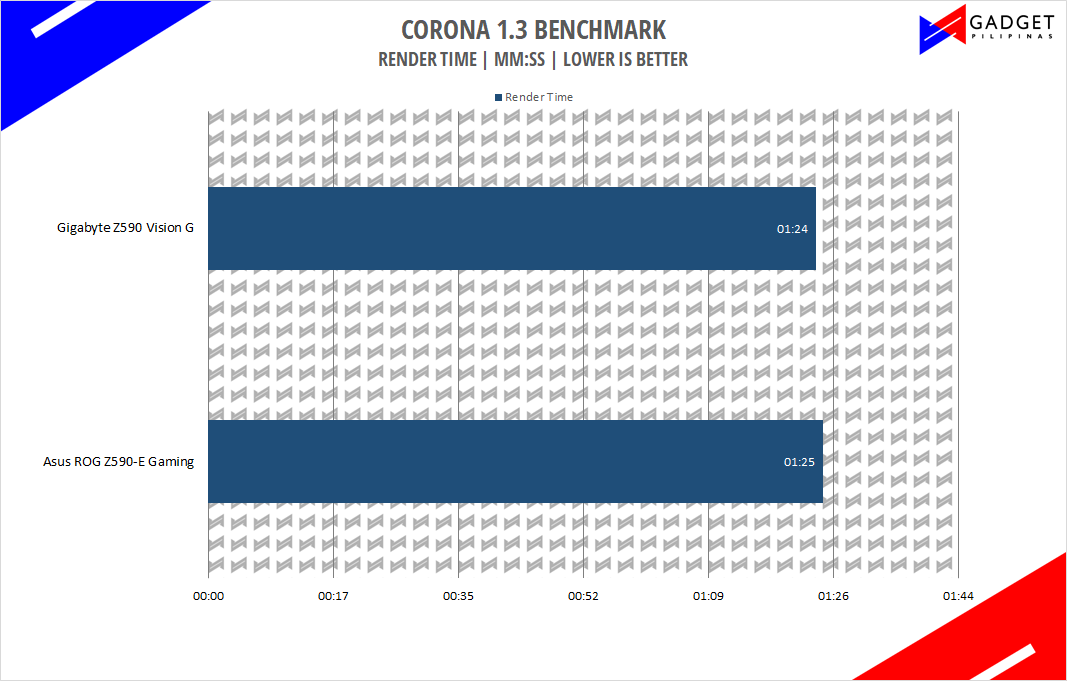 Corona Renderer is an unbiased photorealistic render available for Autodesk 3Ds Max, Maxon Cinema 4D, and as a stand-alone application. Its popularity, similar to Blender, led Chaos Group to develop a benchmark version of the app which runs using Corona Renderer 1.3. Workstation systems, especially CPUs, can utilize Corona Benchmark as up to 72 threads can be used in the benchmark, making it very suitable for CPUs with various price segments.
Corona Renderer is an unbiased photorealistic render available for Autodesk 3Ds Max, Maxon Cinema 4D, and as a stand-alone application. Its popularity, similar to Blender, led Chaos Group to develop a benchmark version of the app which runs using Corona Renderer 1.3. Workstation systems, especially CPUs, can utilize Corona Benchmark as up to 72 threads can be used in the benchmark, making it very suitable for CPUs with various price segments.
ASUS ROG Strix Z590-E UEFI BIOS
- ASUS ROG Strix Z590 E Review BIOS 06
- ASUS ROG Strix Z590 E Review BIOS 06
- ASUS ROG Strix Z590 E Review BIOS 01
- ASUS ROG Strix Z590 E Review BIOS 01
- ASUS ROG Strix Z590 E Review BIOS 02
- ASUS ROG Strix Z590 E Review BIOS 02
- ASUS ROG Strix Z590 E Review BIOS 03
- ASUS ROG Strix Z590 E Review BIOS 03
- ASUS ROG Strix Z590 E Review BIOS 04
- ASUS ROG Strix Z590 E Review BIOS 04
- ASUS ROG Strix Z590 E Review BIOS 05
- ASUS ROG Strix Z590 E Review BIOS 05
Not much has changed on ASUS ROG’s signature UEFI Bios with the exception of the added settings for 11th Generation Rocket Lake-S processors. Users who plan to overclock will spend most of their time on the AI Tweaker tab as it contains almost every setting related to overclocking particularly the ratios and voltages. The AI Overclocking feature can simply be turned on by selecting the Core Ratios setting to “AI Optimized.” You can read more about our Z590 AI Feature Deep Dive here.
ASUS ROG Strix Z590-E VRM Thermals
Our stress test consists of an Aida64 system stability test with a Cinebench R20 multi-core render loop running for one hour. We then measured the VRM temperatures as well as the back-side of the PCB using our K-type thermometer. Despite the heavy workload, the ASUS ROG Z590-E Gaming WiFi didn’t manage to break a sweat with a peak recorded temperature of only 54°C leaving much headroom if we were to overclock the Intel Core i9 11900K. That said, we weren’t lucky in the silicon lottery with our 11900K model which resulted in ommiting the OC testing.
CONCLUSION
The improvements made on the Z590-E Gaming motherboard over its predecessor make it very close to high-end Maximus-level performance with the omission of cherry-on-top features such as a built-in power button and Thunderbolt. Its VRM temperatures are cool enough to take on Intel’s latest flagship gaming processors. The implementation of AI functionalities specifically AI Cooling and AI Overclocking allows newbies to maximize their PC’s performance with a few clicks. It also empowers enthusiasts to fine-tune their PC without many ordeals of trial and error.
The ASUS ROG Strix Z590-E could easily be the best motherboard for its price range if it maintained its predecessor’s price tag of Php 14,540. However, the improvements made such as better VRMs, WiFi 6E, more M.2 SSD slots with a quality of life upgrade with the Q-Latch feature not to mention the AI features, make it on the leagues of high-end motherboards despite the mid-range Strix branding.
Despite its complicated dystopian gamer-y look, the ASUS ROG Strix Z590-E makes it easy for anyone to extract more performance out of their system without pouring countless hours into learning every aspect of optimization simply with the help of its foolproof BIOS, software, and AI as well as the hours spent on testing these optimizations. That said, for anyone looking for a motherboard with a robust connectivity that rivals those of top-tier motherboards and can maximize Intel’s latest Rocket Lake-S, then the ASUS ROG Strix Z590-E Gaming WiFi will surely not disappoint.
Grant is a Financial Management graduate from UST. His passion for gadgets and tech crossed him over in the industry where he could apply his knowledge as an enthusiast and in-depth analytic skills as a Finance Major. His passion allows him to earn at the same time help Gadget Pilipinas' readers in making smart, value-based decisions and purchases with his reviews and guides.

